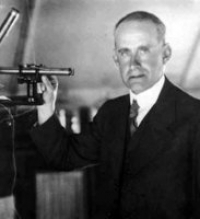Eddington, Arthur Stanley
Arthur Stanley Eddington (1882-1944), an English astrophysicist known for his pioneering understanding of stellar processes; he was among the first to appreciate the importance of Einstein's theories of special and general relativity. On the basis of the precise measurements of atomic weights, he was the first to suggest that stars obtained their energy from nuclear fusion of hydrogen to helium (1920). He calculated that the temperature at the center of the Sun would have to be in the millions of degrees Kelvin. Eddington published the mass-luminosity law for stars in 1924. The Eddington limit, the natural limit to the luminosity that can be radiated by accretion onto a compact object, is named for him. Eddington wrote an article, "Report on the relativity theory of gravitation," which announced Einstein's theory of general relativity to the English-speaking world.
Further Reading
Eddington Biography (University of St. Andrews, Scotland, School of Mathematics and Statistics)
Astrophysics and Mysticism: the life of Arthur Stanley Eddington (Massachusetts Institue of Technology, Plasma Science & Fusion Center]
